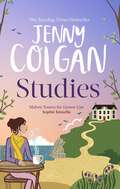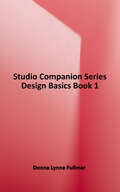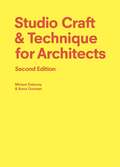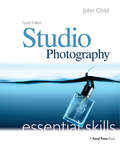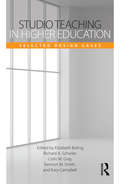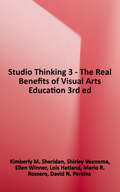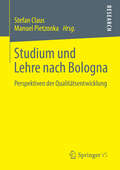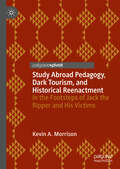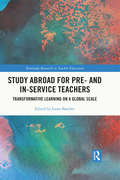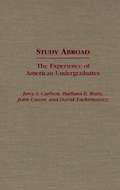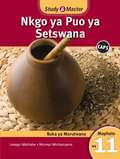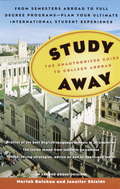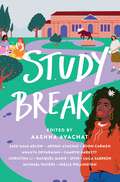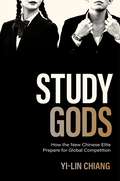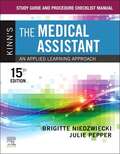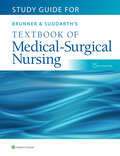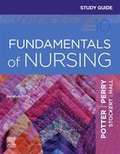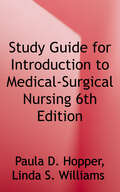- Table View
- List View
Studies: "just like Malory Towers for grown-ups" (Maggie Adair #4)
by Jenny Colgan'MALORY TOWERS FOR GROWN-UPS' SOPHIE KINSELLAJenny Colgan returns with all her signature charm in this fourth installment of her Maggie Adair series. The Little School by the Sea is a magical place of friendship, striving, excitement and plenty of mischief. Maggie Adair, the passionate, devoted English teacher at Downey House, is about to ride off into the sunset with her new love when tragedy strikes. Pulled from their happy-ever-after, she and David must put their budding romance aside until they return for a new term, unsure where they now stand.A fresh new year at Downey House comes with more drama from the students - with Fliss and Alice at odds after a summer apart, and Simone trying to nurture her new relationship while dealing with exam stresses, the new term is shaping up to be a challenge for all...'A BRILLIANT BOARDING SCHOOL BOOK, STUFFED FULL OF UNFORGETTABLE CHARACTERS AND THRILLING ADVENTURES' LISA JEWELL
Studio Companion Series Design Basics, Book One
by Donna Lynne FullmerThe Studio Companion Series consists of four books, available separately or as a set, that provide a launch pad into the study of design and architecture. Clear instructions and a wealth of examples give students a comprehensive look at the entire design process, from concept to presentation. Developed for today’s students, the books present material in a contemporary and graphic manner and are compact and highly portable. The series includes Design Basics, Drafting Basics, 3D Design Basics, and Presentation Basics. Design Basics familiarize students with the fundamental elements and principles of design, offering them a vocabulary to understand and discuss interiors and architecture. Using well-articulated definitions and clear, highly visual examples, this full-color book will expand students' appreciation of design and help them get started creating their own spaces.
Studio Craft & Technique for Architects Second Edition
by Anne Gorman Miriam DelaneyThis one-stop handbook for architecture students provides step-by-step techniques for perfecting the vital skills of drawing, model making and surveying. It is a primer on the conventions of architectural representation and the use of materials. It also explains the primary elements of construction and structure from first principles, using clear diagrams and drawings. Recommended in the first year at numerous architecture schools, this second edition has been updated to include a new section on sustainability, more on types of drawing and when to use them, and more on structural principles and materials.
Studio Craft & Technique for Architects Second Edition
by Anne Gorman Miriam DelaneyThis one-stop handbook for architecture students provides step-by-step techniques for perfecting the vital skills of drawing, model making and surveying. It is a primer on the conventions of architectural representation and the use of materials. It also explains the primary elements of construction and structure from first principles, using clear diagrams and drawings. Recommended in the first year at numerous architecture schools, this second edition has been updated to include a new section on sustainability, more on types of drawing and when to use them, and more on structural principles and materials.
Studio Lighting Unplugged
by Robin Deutschmann Rod DeutschmannThis guide shows photographers how to create studio lighting effects that range from clean and classic to highly complex and use a garage, spare bedroom, or even a backyard as their "studio. "
Studio Lighting Unplugged
by Robin Deutschmann Rod DeutschmannThis guide shows photographers how to create studio lighting effects that range from clean and classic to highly complex and use a garage, spare bedroom, or even a backyard as their "studio. "
Studio Lighting Unplugged
by Robin Deutschmann Rod DeutschmannStudio photography can seem daunting and expensive to the budding photographer, causing many to give up on the idea. However, as Rod and Robin Deutschmann explain in Studio Lighting Unplugged, this needn't be the case when creating professional looking photographs with limited equipment and space. Using small, inexpensive electronic flash units along with budget-friendly stands, communication systems and some do-it-yourself light modifiers, they show readers that it's easy to create refined images in their garages, spare bedrooms and on location.
Studio Photography: Essential Skills (Essential Skills Photography Ser.)
by John ChildStudio photography is a common career path for aspiring photographers and students but the professional and commercial nature of the field makes it a challenging area to break into.Whilst other introductory books on the subject are often bogged down with too much technical detail or too many 'show-off' shots, Studio Photography: Essential Skills offers a practical and accessible guide to the fundamental techniques for successful studio photography. Whether photographing a person or a product, you need control over the light, mood and look to arrive at the perfect result for a particular assignment. This book takes a commercial and creative approach and considers the important elements of lighting, exposure, capture, art direction and the studio setting to ensure a successful shoot.With a clearly structured learning approach and a wide variety of activities and assignments to inspire and engage you, this is an informative, stimulating guide to the basics. Broaden your skills and increase your earning potential with Studio Photography: Essential Skills!
Studio Teaching in Higher Education: Selected Design Cases
by Elizabeth Boling Richard A. Schwier Colin M. Gray Kennon M. Smith Katy CampbellWell-established in some fields and still emerging in others, the studio approach to design education is an increasingly attractive mode of teaching and learning, though its variety of definitions and its high demands can make this pedagogical form somewhat daunting. Studio Teaching in Higher Education provides narrative examples of studio education written by instructors who have engaged in it, both within and outside the instructional design field. These multidisciplinary design cases are enriched by the book’s coverage of the studio concept in design education, heterogeneity of studio, commonalities in practice, and existing and emergent concerns about studio pedagogy. Prefaced by notes on how the design cases were curated and key perspectives from which the reader might view them, Studio Teaching in Higher Education is a supportive, exploratory resource for those considering or actively adapting a studio mode of teaching and learning to their own disciplines.
Studio Thinking 3: The Real Benefits of Visual Arts Education, 3rd Edition
by Ellen Winner Kimberly M. Sheridan Shirley Veenema Lois HetlandThe first edition of this bestseller was featured in The New York Times and The Boston Globe for its groundbreaking research on the positive effects of art education on student learning across the curriculum. Studio Thinking 3 is a new edition of a now-classic text, a research-based account of teaching and learning in high school studio arts classes. It poses a framework that identifies eight habits of mind taught in visual arts and four studio structures by which they are taught. This expanded, full-color edition includes new material about how the framework has been used since the original study, with new perspectives from artist-teachers who currently apply the Studio Thinking Framework in their own practice. It also reviews how contemporary organizations, educators, and researchers outside the arts have utilized the framework, highlighting its flexibility to inform teaching and learning. New chapters for Studio Thinking 3: - Students as Contemporary Artists: Building Agency in the Studio highlights how studio teachers support learner autonomy, including the ability to create increasingly self-directed artworks. - Artist-Teachers examines how artistic practices and teaching practices intertwine and how the Studio Thinking Framework can nurture the relationship between them. - Assessment is a Conversation introduces the practical ways that teachers are using Studio Thinking to assess and evaluate students’ work, working processes, and thinking in the arts. - Studio Thinking discusses how the Studio Thinking Framework has informed teaching and research in visual arts, theater, dance, music, arts integration, STEAM, and other contexts. Studio Thinking 3 will help advocates explain arts education to policymakers, support art teachers in developing and refining their teaching and assessment practices, and assist educators in other disciplines to learn from existing practices in arts education.
Studio and Location Lighting Secrets for Digital Photographers
by Rick Sammon Vered KoshlanoImprove your photography with more than 200 lighting tips from a top photographerWritten by Canon Explorer of Light Rick Sammon and leading fashion and studio photographer Vered Koshlano, this guide is packed with professional advice on the essential element of photography: lighting. It provides detailed information and insider secrets that are bound to make you a better photographer.You'll learn the basics of studio lighting as well as how to achieve special effects. A 90-minute DVD is included, with additional tips on using reflectors, diffusers, accessory flashes, and more.Explores the basics of studio lighting in various situationsFeatures more than 200 lighting tips and secrets for planning and taking the most impressive digital images in the studioCompares available camera equipment, accessories, software, and printing optionsCovers post-shoot digital darkroom techniques and workflow tips and tricksCompanion DVD includes advice on making the most of accessories such as diffusers, reflectors, and accessory flashesWritten by two top professional photographers and illustrated with full-color examplesStudio and Location Lighting Secrets provides information from the pros to improve your photograpic skills.Note: CD-ROM/DVD and other supplementary materials are not included as part of eBook file.
Studium und Lehre nach Bologna
by Stefan Claus Manuel PietzonkaSeit Beginn des Bologna-Prozesses im Jahre 1999 findet in Deutschland die bislang größte Reform des Hochschulsystems statt. Teil dieser Reform sind die gestuften Studiengänge (Bachelor/Master) und die externe Qualitätssicherung durch Akkreditierung. Ausgewählte Experten bilanzieren im Rahmen des Sammelbandes ihre Erfahrungen mit der Reform und ihren Einfluss auf Studium und Lehre. Ihre Studien lassen sich in folgender Kernaussage komprimieren: Die Reform ist noch nicht abgeschlossen; der Europäische Hochschulraum ist noch nicht vollendet.
Study Abroad Pedagogy, Dark Tourism, and Historical Reenactment: In the Footsteps of Jack the Ripper and His Victims
by Kevin A. MorrisonThis book is a genre-breaking response to the literature on study abroad. It stakes claim to an uncharted space between reflective pedagogy, public history studies, and investigations into dark tourism. Drawing on the author’s experience of teaching short-term summer programs and courses in London between 2011 and 2018 that focused wholly or in part on the Whitechapel murders of 1888, the book analyzes experiential learning in the study abroad context. The book is informed by the instructor’s reflections; students’ informal essays and anonymous evaluations; and the scholarship of teaching and learning. It begins by situating programs and courses on the Whitechapel murders in the context of debates about overseas and experiential learning. It then proceeds to discuss the constraints to and possibilities for devising study abroad programs to include graduate students in humanistic disciplines; assignments and classroom activities utilized, including those with a reenactment component; the ethical complexities of teaching at dark sites; and the pedagogical implications of learning about Jack the Ripper in an age of terror. It concludes with reflections on the differences between study abroad programs and courses in cultivating students’ global-mindedness.
Study Abroad for Pre- and In-Service Teachers: Transformative Learning on a Global Scale (Routledge Research in Teacher Education)
by Laura BaecherBy exploring the experiences of pre- and in-service teachers, as well as the design and implementation of study abroad programs developed specifically for them, this volume highlights the potential of international learning in promoting teachers’ global and critical understandings of their roles as educators in an increasingly diverse and interconnected world. Recognizing teacher study abroad as a unique strand within the wider foreign education literature, Study Abroad for Pre- and In-Service Teachers emphasizes how it can be conceptualized, theorized, and implemented as part of initial and continuing teacher training. Chapters consider study abroad programs and teaching practices in Europe, Asia, the Americas, and in Indigenous communities, and document the transformative learning experiences which impact the way teachers think about learning, teaching, and identity. Together, the chapters foreground the personal and professional advantages of teacher study abroad and provide key insights to inform design and programming for sustainable, impactful teacher study abroad which supports teachers in building intercultural competence and enhances their capacity to serve students of varying cultural and linguistic backgrounds. This volume will appeal to researchers, scholars, education abroad facilitators, and teacher educators with an interest in international mobility, multicultural education, culturally responsive pedagogy and study abroad. In addition, pre- and in-service teachers will find the book of value.
Study Abroad: The Experience of American Undergraduates
by Jerry S. Carlson Barbara B. Burn John Useem David YachimoiviczThis book describes the research design, results, and implications of an investigation of American college students who participated in study abroad programs.
Study Abroad: Traditions and New Directions (Teaching Languages, Literatures, and Cultures #5)
by Miriam Fuchs and Sarita RaiThanks to an increasingly interconnected global economy, the role of study abroad in twenty-first-century education has expanded. Student participation continues to grow as disciplinary offerings broaden; meanwhile, programs face persistent challenges to maximize access, strengthen language learning and multicultural awareness, reduce research bias, ensure funding, and maintain safety and security.Designed as a resource for use in creating and conducting courses and programs overseas, Study Abroad: Traditions and New Directions presents a diverse picture of options for study abroad. Contributors' experiences teaching in Asia, Africa, Europe, the Caribbean, and Central America inform analyses of global trends, recommendations for enhanced learning, and course models that can be adapted for a variety of programs and locations. Essays discuss current policies, procedures, and formats including language immersion, interdisciplinary studies, mentored research, professional training abroad, service learning, and institutional partnerships.
Study And Master Nkgo Ya Puo Ya Setswana Mophato wa 11 (learner's Book): UBC contracted
by Lesego Mahlabe Ntompi MoikanyaneStudy & Master Nkgo ya Puo ya Setswana ke metseletsele ya dibuka tse di kwaletsweng barutwana ba Setswana mo Sekgamung sa Dithuto tse Dikgolwane (FET). Dibuka tse, di kwadilwe ka maitemogelo le bokgoni go arabela ditlhokego tsa meetlo, melawana, diteng le dikgono tse solofelwang ke Pegelo ya Pholisi ya Bosetšhaba ya Kharikhulamo le Tlhatlhobo. Buka ya Morutwana • E humile ka ditirwana tse di rotloetsang morutwana go akanya le go tsosolosa kgatlhego ya go itse, go dirisa le go ikgantsha ka puo ya Setswana. • E na le kitsokakaretso e e rulagantsweng ka botswerere go ruta ngwao le setso, go aga botho jo bo feletseng jwa ngwana wa mmala wa sebilo. • E humile thutapuo go tlhokotsa tirisopuo e e lolameng. • Ditlhangwa di tlhophilwe sentle go lebeletswe ditiragalo tsa maloba le tsa sešeng. • E humile ka dikao tsa ditlhatlhobo le mefuta mengwe ya ditekanyetso go ya ka Lenaane la Tekanyetso. Buka ya Morutabana • E rulagantswe ka matsetseleko go kgontsha morutabana go fitlhelela diteng tse di maleba bonolo. • E humile ka dikarabo tse di tshitshintsweng, diruboriki le ditsibogelo tse dingwe tse di maleba tsa ditirwana ka kakaretso. • E kaela morutabana kgato ka kgato ka fa dithuto di ka tsamaisiwang ka gone. • E thusa morutabana go busetsa boleng jwa ngwana wa Motswana ka go mo ruta meetlo, ngwao le setso. • Ke letlhomeso le morutabana a ka agelang dithuto le ditirwana tse dingwe tse di etleetsang dikgono tsa go reetsa le go bua, go buisa le go lebelela, go kwala le go tlhagisa go tsenyeleditswe thutapuo ka matsetseleko.
Study And Master Nkgo Ya Puo Ya Setswana Mophato wa 11 Buka Ya Morutwana (learner's Book): UBC uncontracted
by Lesego Mahlabe Ntompi MoikanyaneStudy & Master Nkgo ya Puo ya Setswana ke metseletsele ya dibuka tse di kwaletsweng barutwana ba Setswana mo Sekgamung sa Dithuto tse Dikgolwane (FET). Dibuka tse, di kwadilwe ka maitemogelo le bokgoni go arabela ditlhokego tsa meetlo, melawana, diteng le dikgono tse solofelwang ke Pegelo ya Pholisi ya Bosetšhaba ya Kharikhulamo le Tlhatlhobo. Buka ya Morutwana • E humile ka ditirwana tse di rotloetsang morutwana go akanya le go tsosolosa kgatlhego ya go itse, go dirisa le go ikgantsha ka puo ya Setswana. • E na le kitsokakaretso e e rulagantsweng ka botswerere go ruta ngwao le setso, go aga botho jo bo feletseng jwa ngwana wa mmala wa sebilo. • E humile thutapuo go tlhokotsa tirisopuo e e lolameng. • Ditlhangwa di tlhophilwe sentle go lebeletswe ditiragalo tsa maloba le tsa sešeng. • E humile ka dikao tsa ditlhatlhobo le mefuta mengwe ya ditekanyetso go ya ka Lenaane la Tekanyetso. Buka ya Morutabana • E rulagantswe ka matsetseleko go kgontsha morutabana go fitlhelela diteng tse di maleba bonolo. • E humile ka dikarabo tse di tshitshintsweng, diruboriki le ditsibogelo tse dingwe tse di maleba tsa ditirwana ka kakaretso. • E kaela morutabana kgato ka kgato ka fa dithuto di ka tsamaisiwang ka gone. • E thusa morutabana go busetsa boleng jwa ngwana wa Motswana ka go mo ruta meetlo, ngwao le setso. • Ke letlhomeso le morutabana a ka agelang dithuto le ditirwana tse dingwe tse di etleetsang dikgono tsa go reetsa le go bua, go buisa le go lebelela, go kwala le go tlhagisa go tsenyeleditswe thutapuo ka matsetseleko.
Study Away
by Mariah Balaban Jennifer ShieldsNow you can go to the college of your dreams and see the world—without compromising on your education (or your parent's budget). This for students by students guide gives you the inside scoop on colleges and programs around the world, with detailed profiles of the best international schools and independent reporting on what life on campus is really like. And since it covers many full undergraduate degree programs, you can decide for yourself if you’d like to complete your degree abroad or simply go for a semester or two. With this frank and accessible book you'll soon be on your way to studying art history in Paris, public health in Kinshasa, or international business in Hong Kong—whatever your major, the experience of living in a foreign country is increasingly desirable in our globalized world. Includes: -68 schools around the world that teach in English and offer American-style degrees -A description of each campus and its academic reputation -Tuition rates and financial aid information -Housing options, extracuricular activities, and support services -Contact information and directions on how to apply -Advice on staying healthy and staying safe From the Trade Paperback edition.
Study Break: 11 College Tales from Orientation to Graduation
by Michael Waters Camryn Garrett Christina Li Jake Maia Arlow Laila Sabreen Racquel Marie Arushi Avachat Boon Carmen Ananya Devarajan Oyin Joelle WellingtonStudy Break, a collection of interconnected contemporary Young Adult short stories written by Gen Z authors, explores different parts of "the college experience," from questioning your major to questioning your identity.College...the best time, the worst time, and something in between.What do you do when orientation isn't going according to your (sister's) detailed plans? Where do you go when you're searching for community in faith? How do you figure out what it means that you're suddenly attracted to your RA? What happens when your partner for your last film project is also your crush and graduation is quickly approaching?Told over the course of one academic year, this collection of stories set on the same fictional campus features students from different cultures, genders, and interests learning more about who they are and who they want to be. From new careers to community to (almost) missed connections — and more — these interconnected tales explore the ways university life can be stressful and confusing and exciting and fulfilling. Gen Z contributors include Jake Maia Arlow, Arushi Avachat, Boon Carmen, Ananya Devarajan, Camryn Garrett, Christina Li, Racquel Marie, Oyin, Laila Sabreen, Michael Waters, and Joelle Wellington.
Study Gods: How the New Chinese Elite Prepare for Global Competition (Princeton Studies in Contemporary China #15)
by Yi-Lin ChiangHow privileged adolescents in China acquire status and why this helps them succeed Study Gods offers a rare look at the ways privileged youth in China prepare themselves to join the ranks of the global elite. Yi-Lin Chiang shows how these competitive Chinese high schoolers first become “study gods” (xueshen), a term describing academically high-performing students. Constant studying, however, is not what explains their success, for these young people appear god-like in their effortless abilities to excel. Instead, Chiang explores how elite adolescents achieve by absorbing and implementing the rules surrounding status.Drawing from eight years of fieldwork and extensive interviews, Chiang reveals the important lessons that Chinese youth learn in their pursuit of elite status. They understand the hierarchy of the status system, recognizing and acquiring the characteristics that are prized, while avoiding those that are not. They maintain status by expecting differential treatment and performing status-based behaviors, which guide their daily interactions with peers, teachers, and parents. Lastly, with the help of resourceful parents, they rely on external assistance in the face of potential obstacles and failures. Chiang looks at how students hone these skills, applying them as they head to colleges and careers around the world, and in their relationships with colleagues and supervisors.Highlighting another facet of China’s rising power, Study Gods announces the arrival of a new generation to the realm of global competition.
Study Guide and Procedure Checklist Manual for Kinn's The Medical Assistant: An Applied Learning Approach
by Julie Pepper Brigitte NiedzwieckiDesigned to support the trusted content in Kinn’s The Medical Assistant, 15th Edition, this study guide is an essential review and practice companion to reinforce key concepts, encourage critical thinking, and help you apply medical assisting content. This robust companion guide offers a wide range of activities to strengthen your understanding of common administrative and clinical skills ― including certification preparation questions, a review of medical terminology and anatomy, and application exercises. Trusted for more than 65 years as a key part of the journey from classroom to career, it also features competency checklists to accurately measure your progress and performance from day one until you land your first job as a medical assistant.
Study Guide for Brunner & Suddarth's Textbook of Medical-Surgical Nursing
by Janice HinkleHelp students make the most of what they’ve learned in Brunner & Suddarth's Textbook of Medical-Surgical Nursing, 15th Edition, with this easy-to-use study companion. Updated to reflect the latest textbook material, this Study Guide provides everything students need to assess their understanding and practice applying their knowledge, preparing them for success in your class, on the NCLEX® exam, and in nursing practice.
Study Guide for Fundamentals of Nursing
by Geralyn OchsThis guide has been developed to encourage independent learning for beginner nursing students and it helps reinforce understanding of key nursing concepts through review questions, exercises, and learning activities.
Study Guide for Understanding Medical Surgical Nursing
by Linda S. Williams Paula D. HopperHere’s the perfect companion to Understanding Medical-Surgical Nursing, Sixth Edition. It offers the practice nursing students need to hone their critical-thinking and problem-solving skills, while mastering the principles, concepts, and procedures essential to success in the classroom and in practice.
